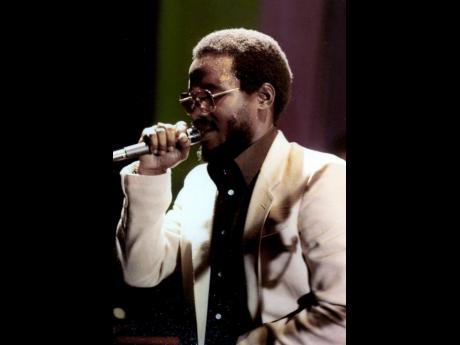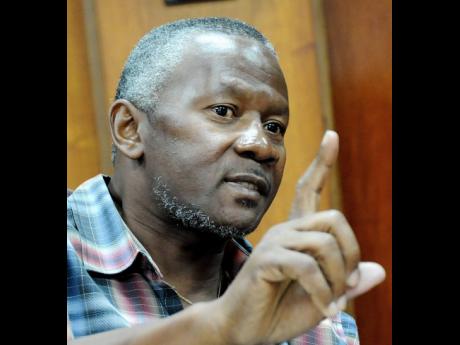‘Gwaaan, Delroy!’
Michael Barnett remembers ‘exceptional’ Delroy Wilson on his 75th birthday
Ask musicologist Michael Barnett about singer Delroy Wilson, and he can talk for hours, non-stop. “Delroy is, and was, and will forever be one of my favourite singers,” a passionate Barnett said of the foundation singer who would have celebrated his 75th birthday today.
“Delroy was the first child star and the first superstar out of Jamaica. He did his first album for Studio One when he was 13 years old. Dennis Brown copied Delroy Wilson, and so too did Errol Dunkley, who himself was a child star,” Barnett shared.
With a laugh, he recalled that Delroy Wilson actually wrote a song aimed at Dunkley, the classic Yuh Trying to Conquer Me.
Barnett, a concert promoter whose Startime series is the stuff of which legends are made, went down memory lane and stopped at the then Oceana Hotel in downtown Kingston, where, as manager, he started the series.
“The first year of Startime in 1988, Delroy Wilson was the star of the December show. Artistes like Beres Hammond, the Diamonds and the Tamlins came to that show because Delroy hadn’t performed in a while and they wanted to see him. Before the show, I told him that I noticed that during his live performances he was scatting the songs, but for this show ‘just sing the songs like how yuh record them’. Man, I tell you, that night Oceana roof nearly come off,” a pleased Barnett said.
HEADLINE ACT
So successful was the show, that when the new season of Startime started in April the following year, Delroy Wilson was the headline act, and the concert was moved from the hotel’s bar to the poolside, which could hold 10 times as many persons. It was a sold-out affair.
“Delroy had this thing which he came up with. ‘If oonu want more Delroy, just seh ‘Gwaaan Delroy!’ And the people would shout it out, stretching out the word ‘gwaan’ with at least three letter ‘A’s. Even when I am playing Delroy’s songs on Kool FM I sometimes open the mic and say, ‘Gwaaan Delroy!’ Delroy was just exceptional,” Barnett said.
Delroy Wilson, acknowledged as one of Jamaica’s most soulful vocalists, died on March 6, 1995, at the University Hospital of the West Indies of complications from cirrhosis of the liver. He was 46 years old and had a music career that spanned close to four decades. For Barnett, “The saddest thing about Delroy is that he wasn’t able to take full advantage of the rebirth and capitalise on his earnings.”
He remembered that the last concert that he staged with the singer was Get Ready, Rocksteady.
“Delroy Wilson was the forerunner who created the phenomenon that Jamaican music became. If there are four pillars of Jamaican music, they would have to be Delroy Wilson, John Holt, Alton Ellis and Ken Boothe,” the Kool FM jock said.
Barnett also shared a story told to him by John Holt, who said that when he was a member of The Paragons, after rehearsals the group would visit a bar at the corner of Duke and East Queen streets.
“John said that they would go in there and punch Delroy Wilson songs in the juke box and dream of a day when they, too, would have songs like Delroy. Imagine...The Paragons wishing that. When it comes to songs, I can’t name one favourite Delroy Wilson, but I can name three of my favourites. They are As Long as You Love Me, I’m Still Waiting and I’m Not a King. I will be featuring Delroy on his birthday [today] from 7 - 7:30 p.m. and also on Friday from 6:30 - 7:30 p.m. Gwaaan Delroy!”
Born on October 5, 1948, in Trench Town, Delroy Wilson was placed on a path to greatness when he linked with producer Coxsone Dodd in 1962. His Wikipedia bio states that his early years with Coxsone yielded a number of ska hits, the biggest of which, the Lee Perry-written Joe Liges, was an attack on rival producer and former Dodd employee, Prince Buster. This was followed by another Perry-written attack on Buster, Spit in the Sky. Further singles followed, including One Two Three, I Shall Not Remove, Look Who Is Back Again (a duet with Slim Smith), and another anti-Buster song, Prince Pharaoh.
HITS
His voice matured as he left his teens, around the time of ska’s transition to rocksteady, and this period in the late 1960s produced many hits, including one of the first rocksteady records, Dancing Mood, Jerk in Time (with the Wailers), Feel Good All Over, I’m Not a King, True Believer in Love, Rain From the Skies, Conquer Me and Riding for a Fall.
Won’t You Come Home, a duet with Ken Boothe, has become one of the most-versioned Jamaican tracks ever. After leaving Studio One, he recorded for other labels, and enjoyed success with Bunny Lee in the late 1960s and early 1970s with tracks such as This Old Heart of Mine, Footsteps of Another Man, and Better Must Come. His double A-side It Hurts/Put Yourself in My Place was a skinhead favourite and narrowly missed UK chart success.
Wilson toured the UK and recorded for Trojan Records in 1970.
In 1972, the People’s National Party chose Better Must Come as their election campaign song; and that same year saw the release of one of his most popular songs, Cool Operator, which became his nickname. He worked with a string of producers in the years that followed, including Joe Gibbs, Gussie Clarke, Winston ‘Niney’ Holness , Harry J, and Joseph Hoo Kim.
Wilson is immortalised by The Clash in their 1978 track (White Man) In Hammersmith Palais with the lines “Delroy Wilson, you’re a cool operator”. In 2013 Delroy Wilson was posthumously awarded the Order of Distinction by the Jamaican Government.


